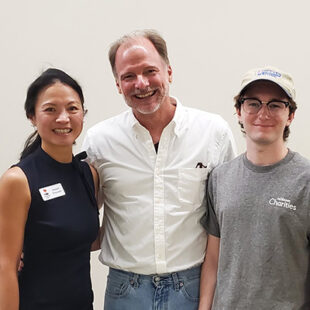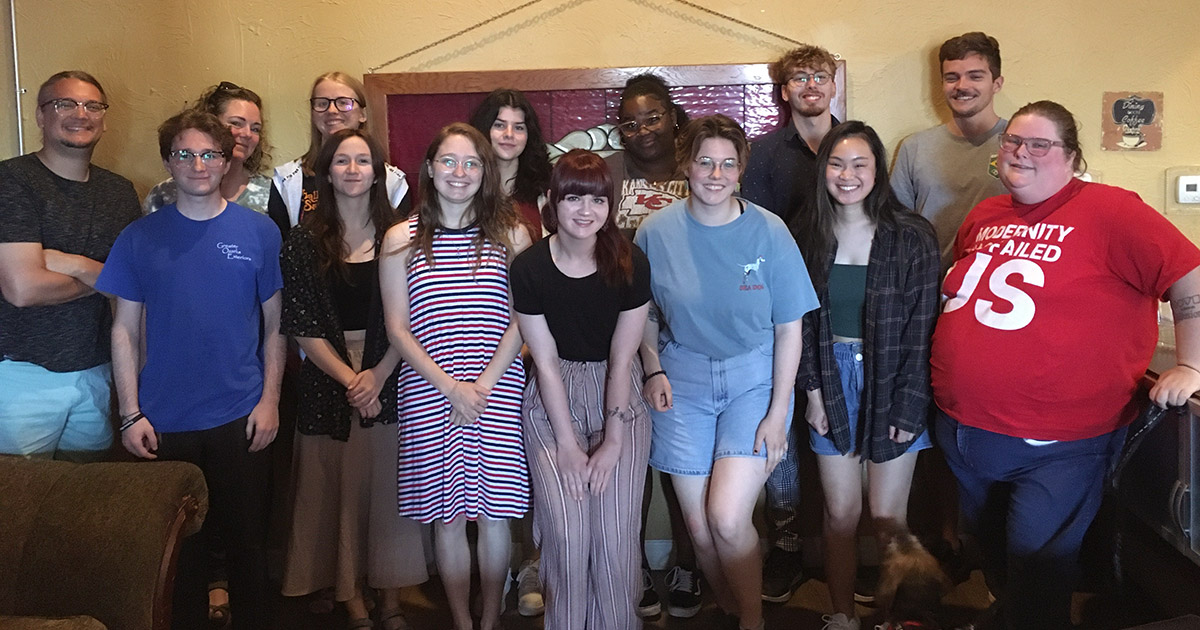When observing to efactory executive director Rachel Anderson that the Springfield, Missouri, community demonstrated a distinct “connectedness,” Dr. Alan Tinkler was inspired by Anderson’s response.
“That’s the Springfield Way,” Anderson said.
With that, The Springfield Way project was born.
The Springfield Way is a new initiative, developed by Missouri State University faculty and Springfield area nonprofit organizations, that provides paid internships for students looking to enhance their educational experience through community-engaged learning.
As the program’s coordinator, Tinkler drew upon his experience with The Shepherd Consortium to bring community-engaged learning to Springfield.
Summer 2023 session focuses on housing insecurity
The Springfield Way launched in summer 2023 under the theme of housing insecurity and homelessness. The inaugural session paired fourteen students with six nonprofit organizations.
During the session, interns received compensation for their work, tuition support and enrolled in a course developed by Dr. Katie Hoegeman, Associate Professor of Sociology at Missouri State, to support the program’s learning outcomes.
Once matched with a nonprofit, the interns completed a Community Learning Agreement that “outlined the scope of work and the intended learning outcomes,” Tinkler said. The agreement helped students adapt quickly to their work.
Emily Fessler, Continuum of Care Coordinator at Community Partnership of the Ozarks (CPO), praised the process.
“The matching process…provided a strong intern with the right skills for my program,” Fessler said.
Participating students were David Brockway, Madeline Cope, Jordan Donley, Alyssa Farrar, Megan Garbee, Hannah Grumbine, Bruno Guerra, Bradie Johnson, Jane McCormick, Kinli Miller, Tyler Peters, Ashley Purvis, Alana Rowan and Morgan Wilson.
The interns worked for the following nonprofit organizations: the Community Partnership of the Ozarks (CPO), the Drew Lewis Foundation, empower: abilities, HOME Team, The Humanitarian Way and The Kitchen, Inc.
Capacity building at the local level

The Springfield Way’s mission is to match talented students with area nonprofits to create “capacity building” relationships, Tinkler explained.
Capacity building assigns important tasks to interns so the nonprofit organizations can focus on other goals to advance their missions.
Fessler found the capacity building aspect of The Springfield Way especially helpful.
“My expectation was that through this program, I would be matched with a student that would have the skills and expertise to assist in a way that would allow for greater capacity in my work,” Fessler said.
For Aileen Dressler of HOME Team, The Springfield Way’s mission aligned perfectly with her ideas about what students and local communities can accomplish in ways that are “mutually beneficial.”
“We provided a variety of options so we had the flexibility to capitalize on the intern’s strengths,” Dressler said.
Meaningful learning through practical experience
Student intern David Brockway learned about The Springfield Way from the Department of English, which distributed information flyers about the program.
“The internship caught my eye because I was interested in the concept of service-learning; learning facilitated through practical experience,” Brockway said.
Brockway interned with the Drew Lewis Foundation, where he created documents, conducted grant research and helped with general correspondence.
“I was hoping to make connections, become educated about issues facing my community, learn about the subject matter (for me, that was an emphasis on technical writing), and to have the opportunity to see what working in the professional nonprofit field might look like. I think the internship checked all of those boxes and then some!”
Intern Alyssa Farrar learned about The Springfield Way through an email announcement from the Department of Communication, Media, Journalism and Film. Farrar interned at The Kitchen, Inc., as a Success Story Specialist.
“I wanted to be actionable about an epidemic in our community – homelessness and housing insecurity in Springfield,” Farrar explained.
During her internship, Farrar interviewed several individuals impacted by homelessness and created informational articles and videos “that would be shared with community partners and supporters.”
Cohort structure inspires connectedness
The cohort structure of the program also appealed to the students.
“Internships can be isolating, and the cohort ensured that they had peer support and connectedness,” Tinkler observed. Students “were able to be in conversation with each other as the summer progressed (rather than feeling alone).”
The cohort structure is one reason Farrar would recommend The Springfield Way internship to students.
“Getting to hear feedback from other interns and interacting with local nonprofits in this new way allowed us to identify obstacles and inform changes for the next years of The Springfield Way,” Farrar said.
An “enlightening” experience
Brockway described his internship experience as “enlightening” and recommended the program for what it offers students long-term.
“It allows you to gain experience and network in the professional field,” Brockway explained, something he described as “invaluable” to his future job prospects.
But Brockway added that The Springfield Way also provides students with special insight into the community around them.
“It gives you the opportunity to learn about vital issues that face the community that you may be insulated from as a college student,” Brockway explained.
Tinkler noted the importance of students making that kind of connection.
“Given [Missouri State’s] Public Affairs mission, this program…allows students to reflect on who they are and how they exist in [the] community,” Tinkler said.
“All the interns will live in communities where housing insecurity and homelessness is an issue, so we are building community connections and understanding through the internship program.”
Fessler agreed. “Even if those students don’t end up at one of our agencies in the future, their experiences through this program will push them to become the type of individuals that will drive change in our community because they took the time to listen, engage and grow.”
The program experience was equally meaningful for the participating nonprofit organizations.
“I have and will absolutely recommend the program to other organizations,” Dressler said.
“I appreciate the intergenerational experience, community connection and professional practice/exposure [it brings].”
Fessler described the experience of watching the interns grow and learn as “joyous.”
“The goal for us as organizations is to hire individuals who understand the work, are dedicated to addressing complex issues and see the value in community engagement,” Fessler added.
“It was beautiful to see how these students dove into their work.”
Ambitious future plans
Tinkler has several goals in mind to continue growing The Springfield Way.
Maintaining communication with the program’s community partners to “identify and develop internship opportunities,” is one priority, Tinkler said.
“We will continue to focus on housing, and we may expand to other dimensions, like educational opportunity or food insecurity, as funding allows.”
Another goal is to augment capacity building for participating nonprofits by funding thirty student internships each summer. Currently, the investment per student intern is $2,000, so funding continues to remain an important goal.
More internships that span “several types of nonprofits” will ensure that individuals and families “are safe and [can] thrive in our community,” Tinkler said.
Still another goal is to get the word out to students. There will be recruiting events during the Fall 2023 semester, and the application deadline will be announced around that time.
Donor support essential
The Springfield Way would not be possible without the generous support of donors, Tinkler said.
Fessler agreed, stating that funding the internships “allows for more students and agencies to engage in the program.”
“Agencies that assist individuals [who are low or no-income] likely aren’t the types of agencies that can provide paid student experiences and internships yet are the agencies that need the assistance,” Fessler added.
Dressler valued the paid internships for their ability to bring “real-world experience for interns” while allowing community partners “to approach the internship with professional expectations.”
For Brockway, “The paid aspect of the internship wasn’t the most important part of the experience for me; however, I would not have been able to take the time to participate in the internship if I was not being paid.”
To learn more about The Springfield Way, contact Dr. Alan Tinkler or call 417-836-5132.

